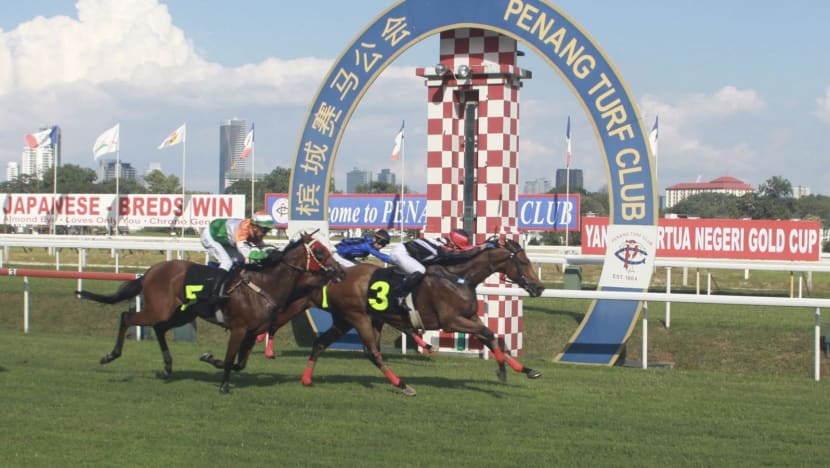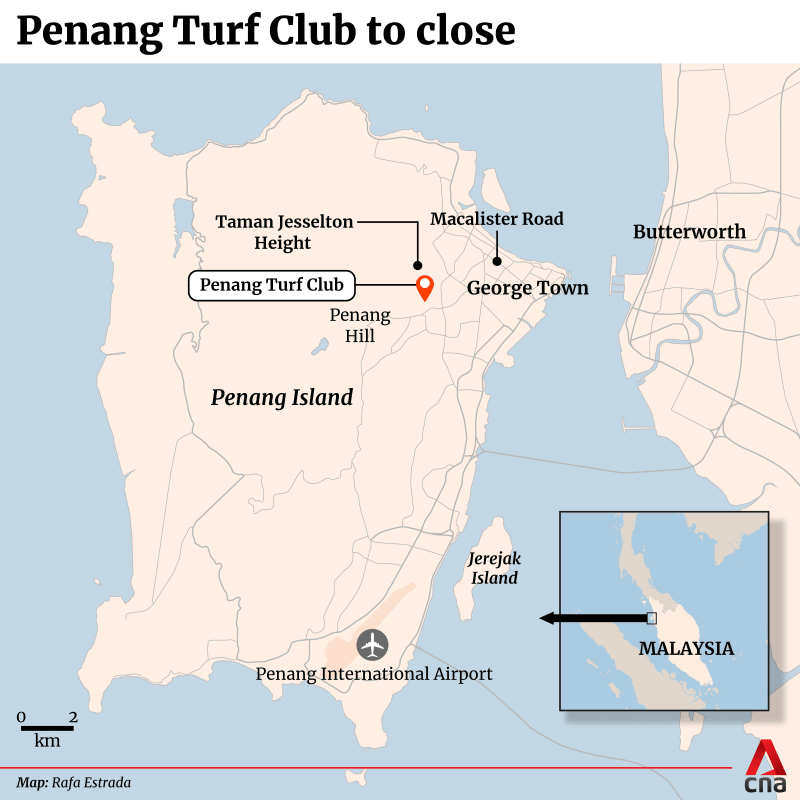Malaysia’s oldest horse racing club to close, last race could be on May 31
The 161-year-old Penang Turf Club’s closure will leave Malaysia with two remaining clubs in Perak and Selangor. Across the Causeway, the Singapore Turf Club in Kranji held its final race in October 2024, closing a 182-year chapter.

Penang Turf Club occupies about 81.7 hectares of prime land in Batu Gantung and currently has two trainers and only eight horses in its stable. (Photo: Facebook/Penang Turf Club)
GEORGE TOWN: Penang Turf Club, Malaysia’s oldest horse racing club, is set to close its doors after its final race at the end of next month to reduce financial losses.
Its closure will leave Malaysia with two remaining turf clubs: Perak Turf Club, established in 1886, and the Selangor Turf Club, founded in 1896.
The closure follows others in the region that have ceased horse-racing activities due to declining interest in the sport, as well as financial challenges in the aftermath of the COVID-19 pandemic.
The Singapore Turf Club in Kranji held its final race in October 2024 after a 182-year chapter, while the Macau Jockey Club closed its doors in April last year.
The Penang Turf Club, established in 1864, is expected to stage its final race meeting on May 31.
The club occupies about 81.7 hectares of prime land in Batu Gantung and currently has two trainers and eight horses in its stable, news outlet The Star reported.
At its second special general meeting on Sunday (Apr 20), 318 out of 320 ordinary members supported the club’s closure. The Star reported that there were two spoiled votes.
Penang Turf Club’s general manager and secretary Leow Khin Ming said a resolution was passed to dissolve the club at the first special general meeting held almost a year ago on June 10, 2024.

According to Leow, the club will be initiating the dissolution process, which is “expected to take at least one to two years”.
“With respect to the cessation of racing activities to reduce losses, the club shall be notifying all relevant parties and authorities that the club intends to cease racing activities on a date to be decided by the club committee,” Leow said on Sunday, as quoted by the New Straits Times.
The Star reported in March that the club will also be terminating contracts with suppliers and service providers. Its 150 employees will be offered a voluntary separation scheme or other retrenchment packages in phases.
CLUB MEMBERS VOTED TO SELL LAND
At the first special general meeting last year, club members had voted to sell its land in Batu Gantung in a motion that was supported by 146 members, with only three members opposing.
The club then launched an open tender to sell the prime land. But the exercise, which closed in December last year, did not draw any bids that qualified.
The club has been looking for alternative ways to realise the land’s value, estimated at RM6 billion (US$1.4 billion), for commercial use, according to Free Malaysia Today.
Its next option is likely to divide the land into smaller parcels for separate sale, a move that could attract a bigger pool of potential buyers, The Star reported.
The Penang Turf Club has occupied the Batu Gantung site, next to the upscale Taman Jesselton Height, since 1939.
It moved from its first race course on Macalister Road, also in George Town, which originated from a free land grant. Its first buildings on Macalister Road were made of wood and attap.
In 2011, the club sold about 23 hectares of its 104-hectare site to Berjaya Land Bhd for RM459 million (US$104 million) to develop a low-density housing project, Malay Mail reported.
In 2002, the club had agreed to sell the entire Batu Gantung site to developer Abad Naluri Sdn Bhd for RM488 million.
The developer had planned to build the Penang Global City Centre, a RM25 billion (US$5.6 billion) mixed-use project incorporating shopping malls, hotels, residences, offices and a cultural centre that was touted as a game changer for Penang.
However, public protests and Abad Naluri’s failure to meet some requirements led to the project being rejected in 2008.
The project was widely said to be behind the fall of the Gerakan party in Penang, local media reported. Currently an opposition party, Gerakan once dominated the state legislature.















